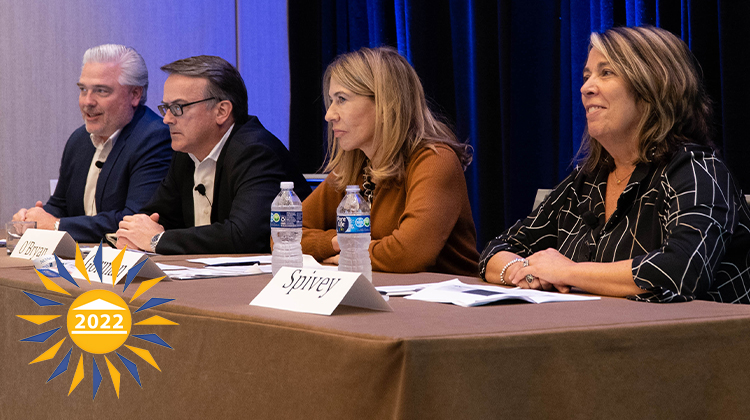Kevin Harnisch, Head of White Collar and Co-Head of Regulation, Investigations, Securities, and Compliance at Norton Rose Fulbright moderated a panel that dissected the interplay between litigation, insurance, and the reinsurance and legacy worlds vis-à-vis ESG. The panel consisted of John O’Bryan, Partner at Freeborn & Peters, Maureen Gorman, Managing Director at Marsh, and Leah Spivey, Head of Claims Runoff Solutions at Munich Re.
Mr. O’Bryan kicked off the discussion with an overview of the current state of litigation on ESG disclosures and climate change. He first noted that the Net Zero Insurance Alliance is committed to establishing underwriting principles that meet the requirements of the Paris Agreement. He further noted that most climate-change litigation is currently mired in procedural disputes, and it will be some time before there will be substantive decisions. The majority of federal courts that have considered the issue have found that federal causes of action on climate change are largely pre-empted by the Clean Air Act. Accordingly, plaintiffs have shifted to suits in state court, where causes of action include public and private nuisance, trespass, and failure to warn. Plaintiffs primarily consist of states and municipalities.
With regard to corporate ESG statements in particular, companies are attempting to use “soft” language like “target” or “goal” to avoid being tagged with a legally enforceable commitment. Mr. O’Bryan raised the possibility that plaintiffs might begin to assert causes of action predicated on Section 323 of the Restatement (Second) of Torts, arguing that a corporation has taken on obligations by virtue of its ESG statement with which it then fails to comply. Mr. Harnisch agreed, pointing out that the SEC is looking at the ESG statements of public companies and trying to get behind the statements to the data as part of its investigations into potential greenwashing.
Mr. O’Bryan also discussed the Royal Dutch Shell case, decided in the Netherlands, as a cautionary tale, as it raises the specter of courts taking the place of national governments in determining how to effect compliance with the Paris Agreement. Specifically, the Dutch court held that the Paris Agreement could be enforced by private parties against other private parties and ordered Shell to meet Paris Agreement standards with respect to its environmental impact. The Dutch court did not find liability on the basis of any ESG statement. The case is currently on appeal.
Next, Ms. Gorman discussed how ESG issues are impacting insurance and reinsurance underwriting. She pointed out that underwriters are looking not only at environmental issues, but also at social and governance issues. Social issues include human capital measurement, DEIB initiatives, wages, human rights issues, and cybersecurity. Governance serves as the umbrella for all of the issues. Underwriters evaluate the Board commitment to ESG, as well as the Board’s understanding of their customers/potential investors and of how risk rating agencies are evaluating them.
Ms. Gorman also noted that insurers and reinsures are attempting to align their underwriting portfolios to the goals of the Net Zero Alliance discussed by Mr. O’Bryan and so the industry may see a change in risk selection. Underwriters do not appear to be focused on particular verticals, but are more focused on the level of risk. The level of risk is evaluated by factors such as at the strength of corporate governance, the robustness of risk management policies and procedures, and the level of reporting on ESG issues. Companies that fail to distinguish themselves on an ESG basis will likely see more stringent terms, which could include lower limits, higher retentions, higher premium, and restricted coverage.
Finally, Ms. Gorman discussed two Marsh initiatives relating to ESG. In the first, Marsh worked with D&O insurers to expand coverage for companies that were working beyond the industry standard to develop a robust ESG framework. Marsh also developed a risk rating tool to help companies do a self-assessment for ESG.
Finally, Ms. Spivey discussed ESG issues from the perspective of a company that has incorporated ESG into its operations. With respect to climate-related issues, she advised that Munich Re has been working on sustainability, the precursor to ESG, since the late 1990s. As part of that initiative, Munich Re has been using renewable energy. In addition, Munich Re has been heavily involved in sustainability initiatives spearheaded by the UN. In all, Munich Re has underwritten 100 projects yielding 42 gigawatts in energy.
Ms. Spivey also discussed the “social” aspect of the equation by referencing Munich Re’s commitment to DEIB goals and noted that Munich Re maintains its commitment in the governance area, as all variable compensation is linked to progress made on ESG. Finally, she emphasized the importance that a commitment to ESG holds in attracting and retaining talent.
